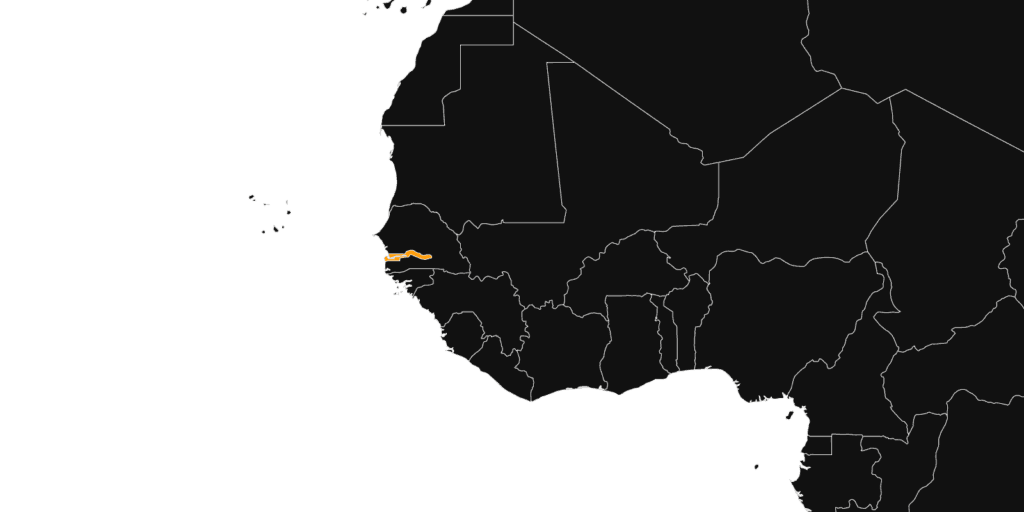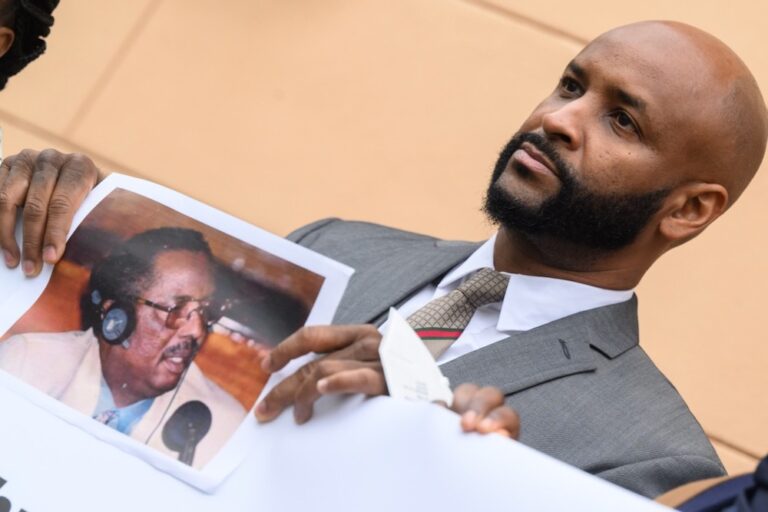The smallest and most densely populated country on the African continent, the Gambia is a popular tourist destination. Yet, until recently, beneath the idyllic surface there was a dark undercurrent where paramilitaries preyed on those who spoke out against former President Yahya Jammeh, killing, torturing and disappearing journalists and opposition activists. The election of a new government, one that has pledged to end violations and to bring justice to victims, brings hope for the hard fought for establishment of democracy.
I sometimes have to tell myself this is not a dream. That this is real. That Jammeh is gone and I can work freely.
CAPITAL: Banjul
POPULATION: 2.039mi
GDP: $964.6m USi
MEMBER OF:
Economic Community of West African States (ECOWAS), African Union, United Nations
IFEX MEMBERS WORKING IN THE COUNTRY:
West African Journalists Association
Media Foundation for West Africa | mfwa.org
PRESS FREEDOM RANKING:
Reporters Without Borders Press Freedom Index 2018: 122 out of 180

A reign of terror under the ‘King of Impunity’
For over two decades, since he seized power in a bloodless coup in 1994, former military officer, Yahya Jammeh ruled the Gambia in a manner that can be described as despotic. A 2015 Human Rights Watch report, Gambia: Two decades of fear and repressionchronicles incomprehensible atrocities: abductions, murders, acute torture among them. Many of the crimes were attributed to a paramilitary group known as the ‘Jungulers’, an elite unit who took their orders directly from the President. Jammeh appeared to revel in his reputation for violence, frequently making public statements that were chilling. For example in 2009 he warned that he would personally kill human rights defenders, saying: ‘I will kill anyone who wants to destabilise this country. If you think that you can collaborate with so-called human rights defenders, and get away with it, you must be living in a dream world. I will kill you, and nothing will come out of it.’ In a country where LGBT people are targets of attack, hate speech and laws criminalising homosexuality, Jammeh’s May 2015 public threat to ‘slit the throats’ of gay people escalated the danger to them to the extreme. It is no wonder that Jammeh earned himself the title of the King of Impunity.
Deeply feared and widely criticised inside and outside the Gambia, Jammeh survived at least four assassination attempts, but was elected to a fourth term in December 2011, in elections that were decried as far from fair. Any person who dared to criticise the election process faced dire consequences. In April 2016, for example, several opposition party members calling for electoral reform were arrested. Two were to die in prison because of the appalling conditions there and lack of medical care.

This photo from 23 October 2013 shows Alhaji, a refugee, in Dakar, Senegal. Alhaji fled his home in Gambia in 2012 after being beaten, tried, and persecuted for being gay. (AP Photo/Jane Hahn)

A shock election result
So, it was a great surprise, when on 1 December 2016, Jammeh’s rival, Adama Barrow, won the presidential elections with 45.5% of the vote over Jammeh’s 36.7%. Not that Jammeh went quietly. At first he conceded defeat, but ten days later, on 10 December, he changed his position, stating that there had been irregularities and that there should be fresh elections. This threw the country into turmoil and as the 19 January inauguration of the Gambia’s new president neared, Jammeh ordered a state of emergency. Military officers accused of siding with Barrow were arrested, radio stations were forced to close, and foreign journalists deported. Meanwhile the Economic Community of West African States (ECOWAS) announced it was gathering forces in neighbouring Senegal and Nigeria to intervene if Barrow was blocked from taking up the presidency.
When it became clear that Jammeh would not step down, the inauguration ceremonywent ahead anyway at the Gambian embassy in Senegal. Two days later, on 21 January, Jammeh conceded defeat and fled into exile in Equatorial Guinea.

A new President brings hope for justice
President Adama Barrow’s approach to power is in stark contrast to his predecessor’s. A former property developer who had spent some time in Britain holding down a low paid retail job to fund his studies, he has had little previous political experience. Yet Barrow’s manifesto pledges protection for human rights, specifically a free press, the release of political prisoners and the setting up of a Truth and Reconciliation Commission to bring justice to victims of Jammeh’s regime, among others.
Among the victims of Jammeh’s era are several journalists:
• Deyda Hydara, editor of The Point, shot dead in 2004, allegedly by Jungulers. In May 2017 a court issued an arrest warrant against two military officers implicated in his murder, a promising early sign that the new government will meet its commitments to bring justice to human rights victims.
• ‘Chief’ Ebrima Manneh, went missing after being arrested by national intelligence officers in 2006. His whereabouts remain unknown.
• Musa Saidykhan, editor of The Independent newspaper, arrested in 2006. Held for 22 days during which time he suffered acute torture.
• Alhagie Abdoulie Ceesay, a radio journalist, arrested in 2015 and sentenced in absentia in November 2016 to four years in prison for sedition. He was reportedly severely tortured.
There was a major breakthrough in the battle against impunity in November 2017, when two senior government officials announced that the government had decided to comply with the rulings of the ECOWAS Court in the cases of murdered editor Deyda Hydara, disappeared reporter ‘Chief’ Ebrima Manneh and tortured journalist Musa Saidykhan. As of June 2018, the government had begun to dispense payments to the families of Deyda Hydara and Ebrima Manneh, while negotiations over Saidykhan’s compensation were ongoing.

Media reforms to bring a new era of hope
In March 2017, President Barrow gave a personal commitment to protecting freedom of expression. “A country cannot develop without strong media and that is why my government is committed to taking steps such as reforming media laws and working with partners to ensure a freer environment for the operations of the media,” he told a delegation from the Media Foundation for West Africa (MFWA), an IFEX member organisation, who met with him to discuss media freedom. Three months later, in June 2017, a media reform initiative kicked off, led by MFWA and the Gambian Press Union, working with the Ministry of Communications. Through a series of workshops and consultations, also involving experts from the Denmark-based International Media Services, the aim is to develop a comprehensive media reform strategy including changes to legislation and policy, capacity building, and the transformation of the state broadcaster to a public service broadcaster. It is planned that the initiative will later by joined by delegates from ECOWAS and the UN.
The engagement of both civil society and government towards change, gives real hope that after decades of terror, a free press and an end to impunity in the Gambia is in sight.
There was cause for further hope in February 2018, when the ECOWAS Court found that The Gambia’s laws criminalising speech and its treatment of four journalists had violated their rights. This landmark judgement, and President Barrow’s public commitment to press freedom, encouraged IFEX members to call on The Gambia to repeal its laws on criminal libel, sedition, and false news. In May 2018, Gambia’s Supreme Court found two of these laws – on criminal libel and false news – to be in violation of the Constitution. The law on sedition remains in place.

MORE RESOURCES & INFORMATION
Musa Saidykhan and Ebrima Manneh: Justice Subverted by the State
AFRICA IFEX 17 October 2016
In 2006, Gambian journalists Musa Saidykhan and Ebrima Manneh were separately arrested and detained by state agents in Banjul, The Gambia. Saidykhan was subjected to brutal torture, while Manneh disappeared with little trace. The ECOWAS Community Court of Justice issued judgements against The Gambia in both cases, finding the state guilty of criminally violating their rights and owing them recompense. Gambian government officials announced in November 2017 that the government would comply with the rulings of the Court.



